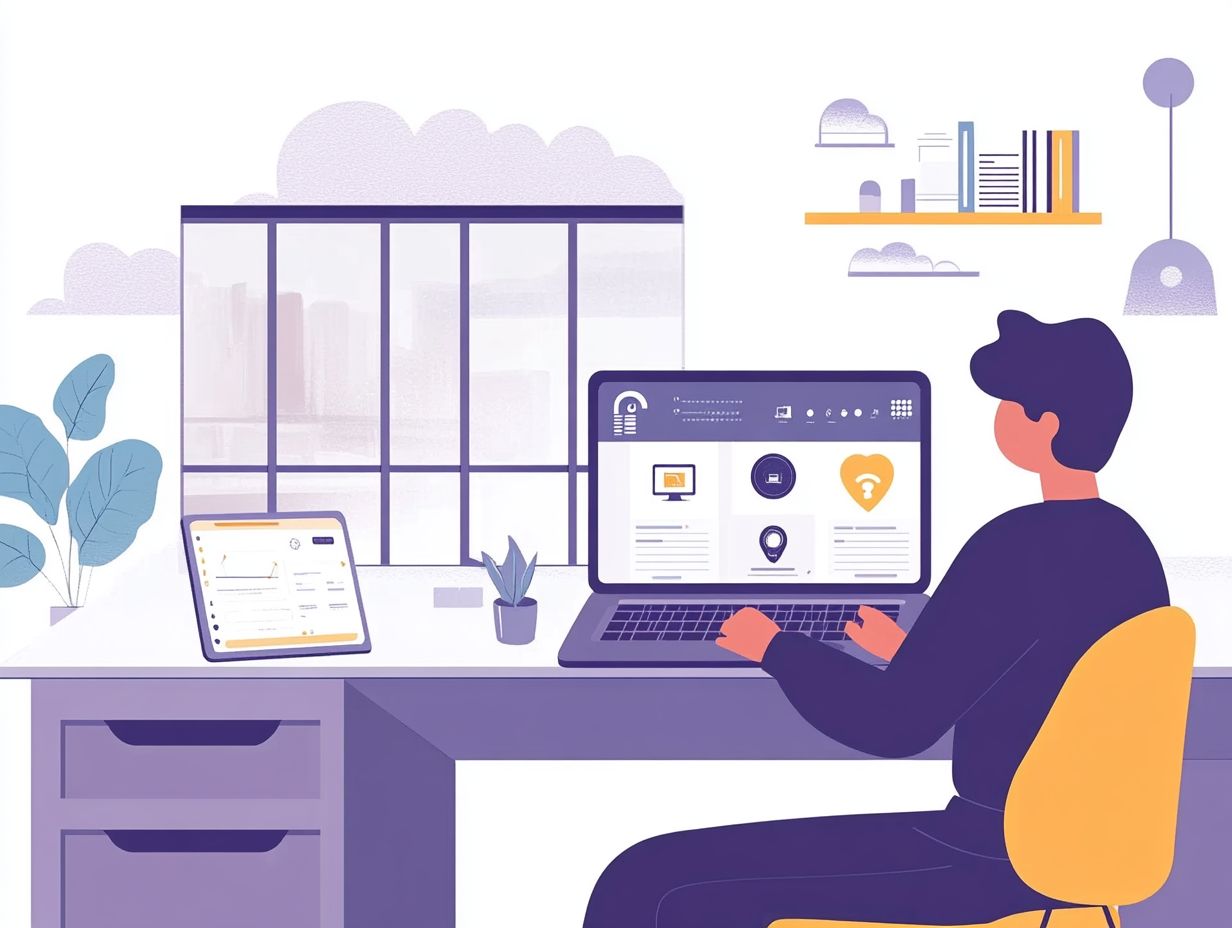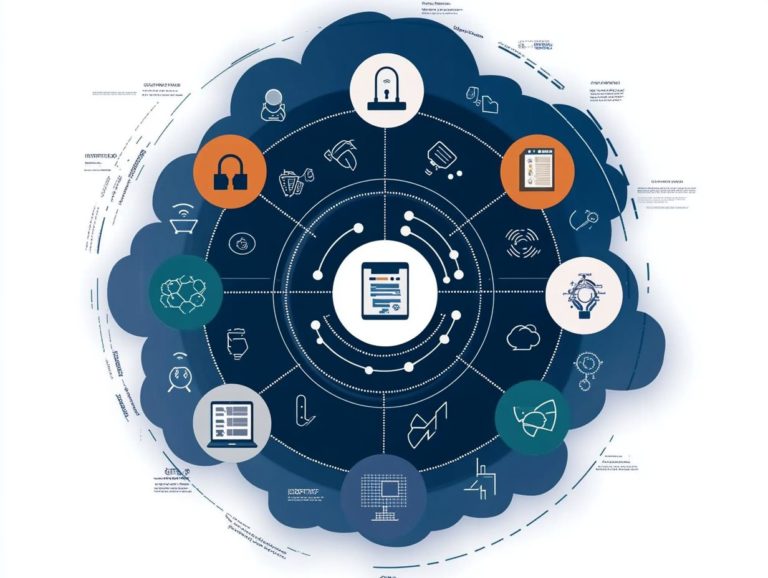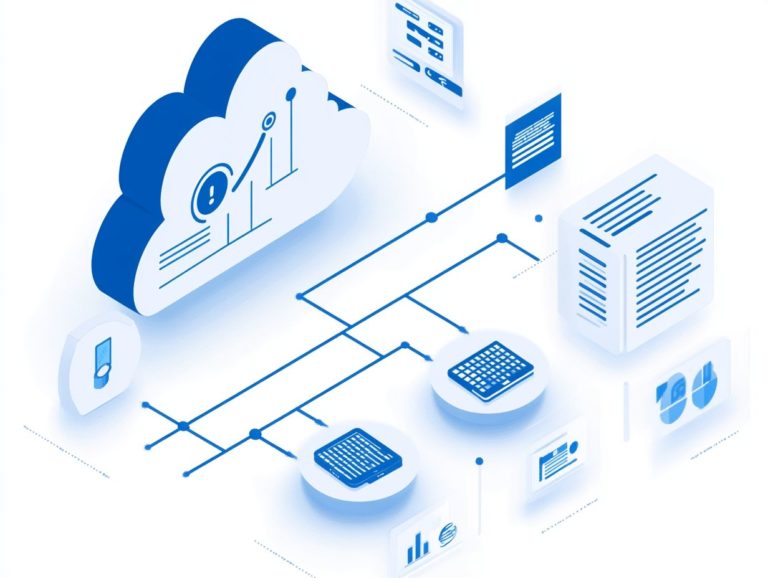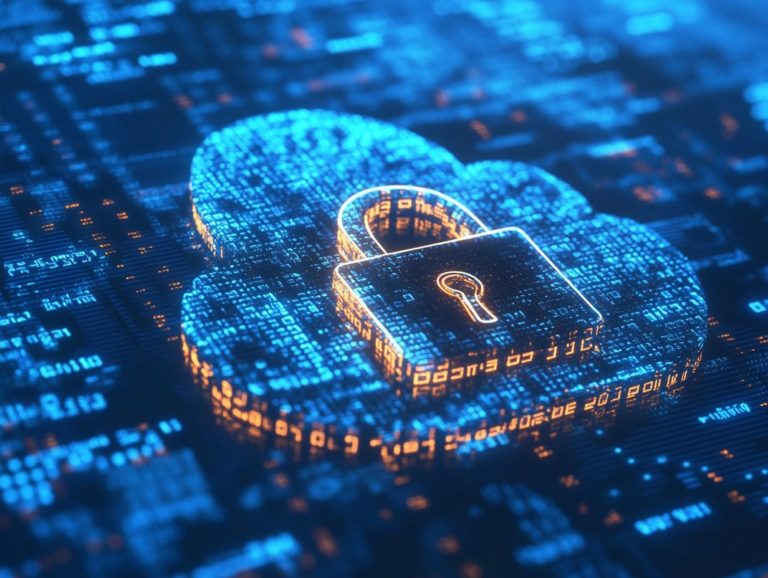Navigating Cloud Security in a Remote Work Environment
In today s fast-paced digital landscape, understanding cloud security is crucial as remote work continues to rise.
This article explores essential cloud security concepts, highlights challenges posed by remote environments, and outlines best practices to protect your data.
You ll discover ways to implement security measures, such as multi-factor authentication a method that requires more than one way to verify your identity. We ll also discuss effective tools like VPNs and Cloud Access Security Brokers to help you comply with relevant regulations.
Join us on this journey as we navigate the complexities of cloud security in remote work.
Contents
- Key Takeaways:
- Understanding Cloud Security
- Challenges of Cloud Security in a Remote Work Environment
- Best Practices for Securing Cloud Data in a Remote Work Environment
- Effective Tools for Cloud Security in a Remote Work Environment
- Ensuring Compliance with Regulations and Standards
- Frequently Asked Questions
- Q1: What is the importance of navigating cloud security in a remote work environment?
- Q2: What are some common security risks associated with remote work and cloud computing?
- Q3: How can organizations ensure the security of their cloud environment in a remote work setup?
- Q4: What are the best ways to secure remote access to cloud services?
- Q5: How can organizations safeguard data on personal devices used for remote work?
- Q6: What tools can help navigate cloud security in a remote work environment?
Key Takeaways:

Implement multi-factor authentication to enhance security for remote workers accessing cloud data.
Update your security measures regularly to stay ahead of evolving threats.
Utilize virtual private networks (VPNs) and cloud access security brokers (CASBs) to strengthen cloud security for remote workers.
Understanding Cloud Security
Cloud security is a strategy that protects your data, applications, and services hosted in the cloud from unauthorized access and cyber threats. It also ensures compliance with various regulations.
As you adopt cloud environments, robust IT security measures become essential to protect sensitive information from vulnerabilities like ransomware, phishing, and insider threats.
Using advanced technologies like encryption and effective identity management practices significantly boosts data privacy and security within the cloud ecosystem.
Organizations like the National Bureau of Economic Research, along with security firms such as Kaspersky and Trend Micro, provide valuable insights and tools to help establish a secure cloud infrastructure.
Defining Key Terms and Concepts
Understanding key terms related to cloud security is vital as you navigate the complexities of IT security.
In today s rapidly changing digital landscape, grasping cloud security nuances is not just beneficial it s essential to protect sensitive information.
Key elements like encryption play a crucial role in safeguarding your data, whether at rest or in transit, effectively preventing unauthorized access. Data privacy also involves your rights over personal information, impacting how you manage compliance obligations.
By aligning these principles with industry regulations, you can create a strong framework that enhances your security posture and fosters trust among stakeholders.
Challenges of Cloud Security in a Remote Work Environment
The rise of remote work presents significant challenges in cloud security due to increased vulnerabilities from extended network perimeters and various personal devices.
As you access enterprise applications from home or a caf , the risk of cyber attacks such as phishing and ransomware skyrockets. It s essential to reassess your security frameworks.
Organizations must act now to address these vulnerabilities with effective strategies like the Zero Trust model (a security concept that requires strict identity verification for everyone trying to access resources). This model emphasizes the use of enterprise VPNs for secure connections.
Managing insider threats is also critical as employees gain broader access to sensitive information, necessitating a proactive approach to security.
Increased Vulnerabilities and Risks
Increased vulnerabilities and risks are urgent concerns in cloud security, especially due to the reliance on remote work and personal devices.
These vulnerabilities can manifest in many ways, such as weak networks vulnerable to exploitation by cybercriminals. Insider threats add complexity, as employees might unintentionally or maliciously compromise sensitive data.
Such breaches can lead to more sophisticated cyber attacks, from deceptive phishing schemes to ransomware that locks you out of your systems until a ransom is paid.
To combat these risks effectively, implement robust security policies, conduct regular employee training, and utilize advanced monitoring tools.
These measures can greatly enhance your organization s defenses and protect against potential threats.
Best Practices for Securing Cloud Data in a Remote Work Environment
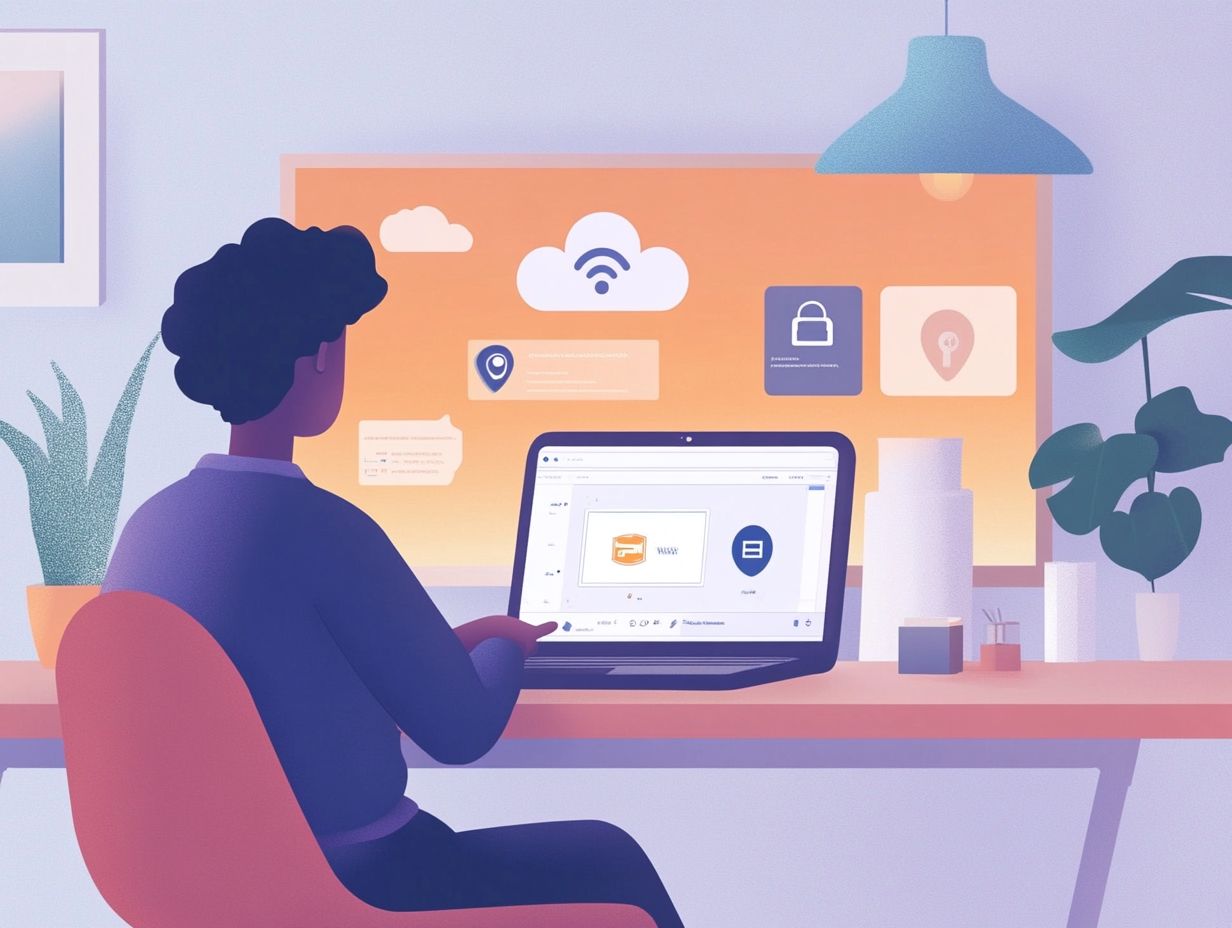
Securing cloud data in a remote work environment demands that you embrace best practices centered around a system where both the company and employees help keep data secure.
This approach ensures that both your organization and employees are actively engaged in maintaining strong cloud security. Each stakeholder has a vital role to play, fostering a collective commitment to safeguarding sensitive information.
Implementing Multi-Factor Authentication
Implementing multi-factor authentication (MFA) is a crucial step in enhancing your cloud security. It introduces an additional layer of identity management designed to prevent unauthorized access.
MFA is very important, especially in today s digital landscape, where cloud environments increasingly host sensitive data. This security measure requires multiple forms of verification before gaining access, significantly reducing the risk of security breaches.
MFA also aligns with various compliance requirements, such as the General Data Protection Regulation (GDPR) and the Health Insurance Portability and Accountability Act (HIPAA). It plays a vital role in protecting confidential information from cyber threats.
Integrate MFA now to build a strong defense against unauthorized breaches, thereby fostering trust with your clients and stakeholders.
Regularly Updating Security Measures
Update your security measures today to stay ahead of cyber threats. Regularly updating your security protocols is crucial for maintaining strong cloud security, especially as cyber threats continue to evolve.
Cybercriminals change their tactics, so prioritize your defense systems to ensure they are equipped to tackle the latest vulnerabilities. Implementing up-to-date antivirus software and incorporating advanced protective technologies can significantly diminish the risk of data breaches.
By complying with industry standards like ISO and NIST, you not only safeguard sensitive information but also bolster the overall trust of your stakeholders. Routinely assess your security protocols and invest in employee training to stay vigilant against potential risks.
Effective Tools for Cloud Security in a Remote Work Environment
Utilizing effective tools for cloud security is essential, particularly in a remote work setting where conventional security measures may fall short in safeguarding against emerging threats.
Virtual Private Networks (VPNs)
Virtual Private Networks (VPNs) are essential tools for securing cloud data. They create encrypted connections that effectively shield sensitive information from unauthorized access.
In today s digital landscape, where cyber threats are more sophisticated than ever, enterprise VPNs become a critical layer of defense for your organization. They help ensure that you can protect your data while remaining compliant with industry regulations like GDPR and HIPAA.
By enabling remote employees to securely access corporate resources, these VPNs not only enhance your network security but also reduce the risks associated with data breaches.
Many companies implement advanced authentication protocols, such as multi-factor authentication, alongside their VPN solutions to strengthen their security posture.
Best practices in this realm include:
- Regularly updating your VPN software
- Conducting vulnerability assessments
- Providing employee training on data protection strategies
This comprehensive approach is key to maintaining strong cloud security.
Cloud Access Security Brokers (CASBs)

Cloud Access Security Brokers (CASBs) act as essential intermediaries that elevate your cloud security by providing visibility and control over data access and usage. They play a pivotal role in crafting robust security protocols tailored to your organization s unique needs.
By harnessing advanced analytics and contextual insights, CASBs enforce policies that regulate user behavior. This ensures compliance with industry regulations and internal standards. These brokers continuously monitor cloud environments for unusual activities, allowing for swift detection and response to potential threats.
Data encryption is another key function that safeguards sensitive information, both in transit and at rest. By utilizing CASBs, you can achieve enhanced governance while effectively mitigating risks associated with cloud services.
Ensuring Compliance with Regulations and Standards
Ensuring compliance with regulations and standards is essential for upholding cloud security. Non-compliance can expose you to serious legal and financial consequences that could significantly impact your organization.
Understanding Applicable Laws and Regulations
Understanding applicable laws and regulations is crucial for your organization. This commitment protects your invaluable information and fortifies your overall IT security practices.
Frameworks like the General Data Protection Regulation (GDPR) and the Health Insurance Portability and Accountability Act (HIPAA) establish strict guidelines for handling personal and sensitive data. Stay informed about your responsibilities under these regulations to avoid severe legal repercussions and hefty financial penalties that could tarnish your organization s reputation.
Act now to meet these obligations and protect your valuable data by embracing best practices such as:
- Conducting regular audits
- Implementing robust encryption techniques
- Training employees on data protection
These measures are crucial for boosting your cloud security and keeping your data safe!
Complying with Industry Standards
Complying with industry standards is essential for your cloud security. These standards serve as a roadmap for safeguarding sensitive information and ensuring data privacy.
Understanding and implementing standards like the Center for Internet Security (CIS) Controls and CIS Benchmarks is critical for your organization. This can effectively enhance your security protocols.
These frameworks provide a structured way to identify vulnerabilities and offer actionable recommendations that fortify your defenses. By adhering to established CIS Controls, you can systematically prioritize your security measures, reducing risks that could jeopardize sensitive data.
This commitment to compliance builds confidence among your stakeholders and clients, reinforcing a culture of transparency and responsibility in your data management.
Frequently Asked Questions
-
A1: With the rise of remote work, organizations rely increasingly on cloud services for data storage and access. This makes it crucial to ensure that proper security measures protect sensitive information from cyber threats.
-
Q2: What are some common security risks associated with remote work and cloud computing?
A2: Common risks include unauthorized access to cloud accounts, data breaches, malware attacks, and insecure devices used by employees to access cloud services.
-
Q3: How can organizations ensure the security of their cloud environment in a remote work setup?
A3: Organizations can implement a multi-layered security approach that includes strong authentication, data encryption, regular security assessments, and employee training on safe remote work practices.
Q4: What are the best ways to secure remote access to cloud services?
A4: Use secure virtual private networks (VPNs) for safe remote access. Employ two-step login for added security and monitor user access to spot suspicious activity.
Q5: How can organizations safeguard data on personal devices used for remote work?
A5: Enforce strict security policies. These include device encryption, antivirus software, and the ability to wipe data remotely.
Creating a secure area on personal devices for work tasks, known as containerization, also helps maintain security.
A6: Consider using cloud access security brokers (CASBs) for visibility and control of cloud services. Cloud workload protection platforms (CWPPs) monitor and protect your applications and data in the cloud.

